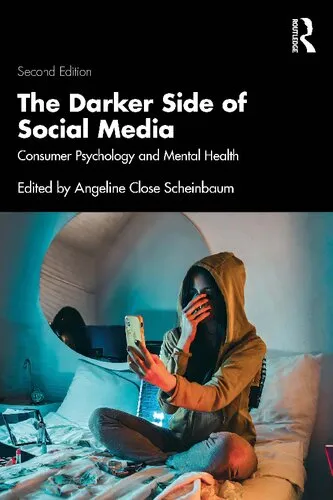The Darker Side of Social Media: Consumer Psychology and Mental Health
4.0
Reviews from our users

You Can Ask your questions from this book's AI after Login
Each download or ask from book AI costs 2 points. To earn more free points, please visit the Points Guide Page and complete some valuable actions.Introduction
Social media has revolutionized how we communicate, connect, and consume information in the modern world. Yet, beneath its promising surface lies a darker side that influences mental health, consumer psychology, and societal behaviors in ways we are only beginning to comprehend. The Darker Side of Social Media: Consumer Psychology and Mental Health delves deep into these critical issues, offering a comprehensive look at the undeniable psychological consequences of social media.
This book is not just a critique of the pitfalls of apps and platforms that dominate our daily routines but also an exploration of how consumer interaction with social media affects emotional well-being, decision-making, and relationships. Written for academics, professionals, and anyone interested in understanding the nuanced realities of social media, the book brings together research, real-world examples, and actionable insights.
By blending academic rigor with accessible language, this book challenges readers to rethink their relationship with digital spaces. It investigates phenomena like cyberbullying, addiction, unrealistic social comparisons, and the manipulation of consumer behavior, uncovering how these elements erode mental health over time. Keep reading to explore the key components this book covers and why it is an essential read in today’s digitally driven world.
Detailed Summary of the Book
The Darker Side of Social Media takes readers on a multidimensional journey into how digital platforms influence human psychology. The book’s structure is organized into thematic explorations, each addressing major aspects of the complex relationship between technology and mental health.
In the initial chapters, the book identifies key psychological issues directly associated with prolonged social media use. Topics include the rise of "social comparison culture," where individuals constantly compare their lives to highly curated versions of others' lives, leading to feelings of inadequacy and low self-esteem. It also tackles the addictive design of platforms, which encourages endless scrolling, fostering dependency and reducing offline interactions.
Later chapters venture into how social media impacts consumer psychology, particularly focusing on how it shapes purchasing decisions. Tactics like targeted advertisements, influencer campaigns, and micro-celebrity endorsements are examined through the lens of how they prey on human emotions and cognitive biases. The book uses studies and statistics to illustrate its points, making the abstract impact of social media tangible.
The closing chapters provide actionable strategies for individuals and corporations alike to mitigate these negative effects. While the book does not demonize technology, it advocates for a balanced approach, educating readers on setting boundaries and becoming smarter, more mindful consumers of digital content.
Key Takeaways
- Social media platforms are intentionally addictive, using algorithms to maximize user engagement at the expense of mental well-being.
- Cyberbullying, FOMO (Fear of Missing Out), and social comparisons significantly contribute to anxiety, depression, and diminished self-worth.
- Consumers are heavily influenced by subtle psychological tactics deployed by marketers and influencers to drive spending habits.
- A balanced relationship with social media is achievable through awareness, intentional use, and psychological resilience-building strategies.
Famous Quotes from the Book
"Social media is not a mirror—it’s a distorted lens. And through that lens, we see not reality but a curated illusion that often leaves us feeling 'less than.'"
"The currency of social media is attention, and in this economy, our well-being is the unintended collateral damage."
"The problem isn’t technology itself; it’s how humans interact with it. In changing our habits, we shift the narrative."
Why This Book Matters
As more of our lives shift online, understanding the mental health implications of social media has never been more critical. This book raises awareness about pervasive problems that often go unnoticed in everyday use. It equips readers with the knowledge to minimize harm while maximizing personal and professional benefits from digital technologies.
For professionals in marketing, psychology, or technology, the book serves as an essential resource for making ethical decisions that prioritize human welfare. For individuals struggling with the challenges of excessive social media use, it offers tools for reclaiming autonomy and fostering healthier interactions with technology.
Above all, The Darker Side of Social Media matters because it provides a timely wake-up call. In a world where digital interactions shape how we think, behave, and feel, this book encourages critically minded engagement. By reading it, you are not just informed—you are empowered to take meaningful action.
Free Direct Download
Get Free Access to Download this and other Thousands of Books (Join Now)
For read this book you need PDF Reader Software like Foxit Reader
Accessing books through legal platforms and public libraries not only supports the rights of authors and publishers but also contributes to the sustainability of reading culture. Before downloading, please take a moment to consider these options.
Find this book on other platforms:
WorldCat helps you find books in libraries worldwide.
See ratings, reviews, and discussions on Goodreads.
Find and buy rare or used books on AbeBooks.


